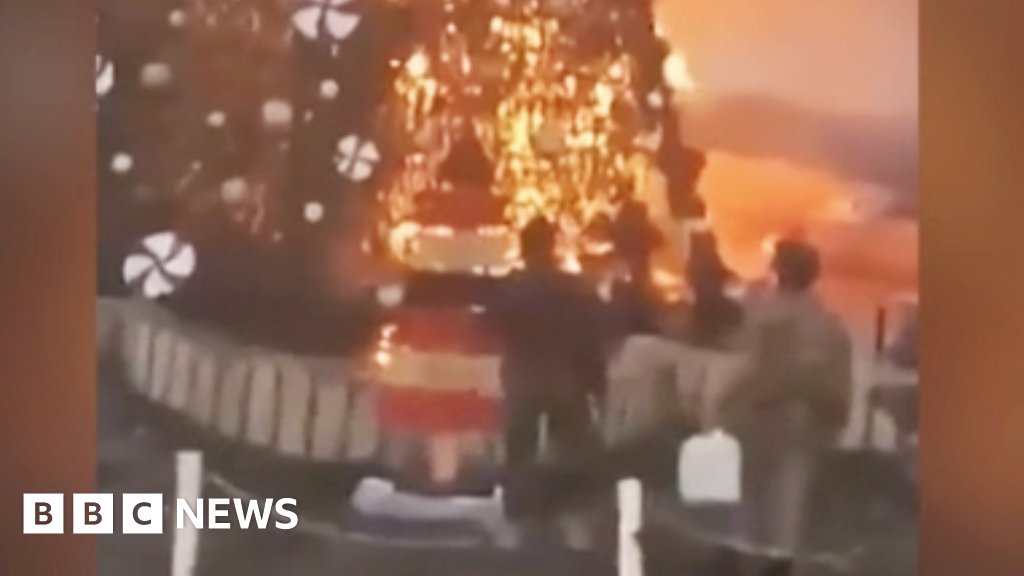Protests have broken out in Syria over the burning of a Christmas tree, prompting calls for the new Islamist authorities to take steps to protect minorities.
A video posted on social media showed the tree on fire in the main square of the Suqaylabiyah, a Christian-majority town in central Syria, with masked men around.
Hayat Tahrir al-Sham (HTS), the main Islamist faction which led the uprising that toppled President Bashar al-Assad, said foreign fighters had been detained over the incident.
HTS representatives have promised to protect the rights and freedoms of religious and ethnic minorities in Syria.
Thousands of demonstrators took to the streets across the country – through Damascus and Suqaylabiyah in Hama province.
Two masked fighters appeared in a video on social media setting fire to the Christmas tree the night before Christians in Syria prepared to celebrate Christmas Eve.
Footage of the aftermath showed a religious figure from the governing HTS rebel group assuring crowds who had gathered in Suqaylabiyah that the tree would be repaired before the morning.
The man then held up a cross in a show of solidarity, something Islamist conservatives would not do.
On Tuesday more protesters took to the streets over the arson attack.
Some in the Kassa neighbourhood of Damascus chanted against foreign fighters in Syria.
“Syria is free, non Syrians should leave,” they said, in reference to the foreign fighters HTS said were behind the attack.
In the Bab Touma neighbourhood of Damascus, protesters carried a cross and Syrian flags, chanting “we will sacrifice our souls for our cross”.
“If we’re not allowed to live our Christian faith in our country, as we used to, then we don’t belong here anymore,” a demonstrator named Georges told AFP news agency.
Syria is home to many ethnic and religious groups, including Kurds, Armenians, Assyrians, Christians, Druze, Alawite Shia and Arab Sunnis, the last of whom make up a majority of the Muslim population.
Just over two weeks ago, Bashar al-Assad’s presidency fell to rebel forces, ending the Assad family’s more than 50-year-rule.
How the HTS group will govern Syria remains to be seen.
HTS began as a jihadist group – espousing violence to achieve its goal of establishing a state governed by Islamic law (Sharia) – but in recent years adopted a more pragmatic, less uncompromising approach.
As fighters marched to Damascus earlier this month, its leaders spoke about building a Syria for all Syrians.
HTS remains designated as a terrorist organisation by the UN, US, EU and UK, though there are signs that a diplomatic shift may be under way.
On Friday, the US has scrapped a $10m (£7.9m) bounty on the head of HTS leader Ahmed al-Sharaa, following meetings between senior diplomats and representatives from the group.
The US is continuing its military presence in Syria. It said on Friday that it carried out an air strike in the northern city of Deir Ezzor – killing two members of the Islamic State (IS) jihadist group.
The presence of foreign fighters, Islamic extremists, or even regime supporters who have interest in causing insecurity and attacking minorities to shake the country’s stability are the big challenge that the new Islamic leadership will face.
